-
 Bitcoin
Bitcoin $106,731.2224
-1.05% -
 Ethereum
Ethereum $2,444.9804
-1.20% -
 Tether USDt
Tether USDt $1.0003
0.01% -
 XRP
XRP $2.1882
0.09% -
 BNB
BNB $651.1435
-0.61% -
 Solana
Solana $148.3252
-2.09% -
 USDC
USDC $1.0000
0.01% -
 TRON
TRON $0.2787
0.55% -
 Dogecoin
Dogecoin $0.1598
-3.16% -
 Cardano
Cardano $0.5520
-2.43% -
 Hyperliquid
Hyperliquid $39.0960
-2.64% -
 Bitcoin Cash
Bitcoin Cash $516.9519
2.98% -
 Sui
Sui $2.7011
-2.95% -
 Chainlink
Chainlink $13.0582
-1.71% -
 UNUS SED LEO
UNUS SED LEO $8.9250
-2.53% -
 Stellar
Stellar $0.2359
-0.18% -
 Avalanche
Avalanche $17.3856
-3.73% -
 Toncoin
Toncoin $2.8095
-3.56% -
 Shiba Inu
Shiba Inu $0.0...01121
-1.95% -
 Litecoin
Litecoin $85.2795
-0.85% -
 Hedera
Hedera $0.1471
-2.15% -
 Monero
Monero $319.8004
1.12% -
 Dai
Dai $1.0001
0.01% -
 Ethena USDe
Ethena USDe $1.0001
0.02% -
 Bitget Token
Bitget Token $4.5344
-1.07% -
 Polkadot
Polkadot $3.3224
-2.96% -
 Uniswap
Uniswap $6.9697
-2.75% -
 Aave
Aave $266.1658
-2.25% -
 Pepe
Pepe $0.0...09414
-3.41% -
 Pi
Pi $0.4913
-3.29%
How to convert Bitcoin into cash? What are the channels for withdrawing cash to bank cards?
Converting Bitcoin to cash involves using exchanges, P2P platforms, Bitcoin ATMs, or OTC desks, followed by withdrawing funds to your bank account or card.
May 08, 2025 at 04:01 pm
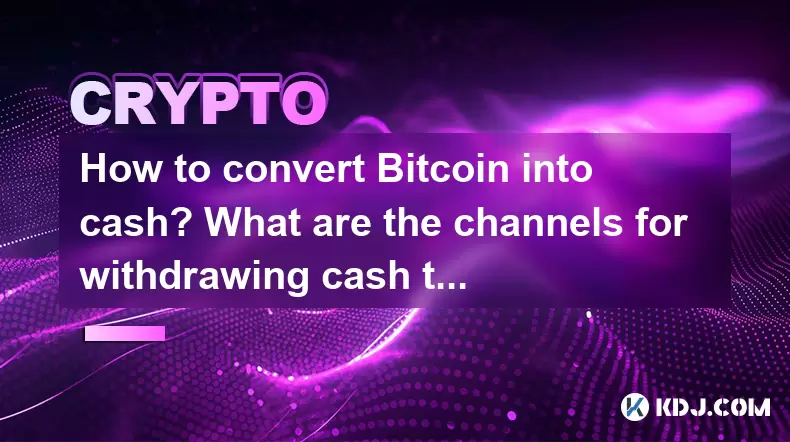
Converting Bitcoin into cash and withdrawing it to a bank card involves several steps and methods, each with its own set of procedures and considerations. This article will guide you through the process, highlighting the different channels available for cashing out your Bitcoin and transferring the funds to your bank account.
Understanding Bitcoin Conversion to Cash
Before diving into the specifics of converting Bitcoin to cash, it's important to understand what this process entails. Bitcoin conversion to cash means selling your Bitcoin for fiat currency, such as USD, EUR, or any other local currency. This can be done through various platforms and methods, each with its own fees, processing times, and levels of security.
Using Cryptocurrency Exchanges
One of the most common methods to convert Bitcoin into cash is through cryptocurrency exchanges. These platforms allow you to sell your Bitcoin in exchange for fiat currency, which can then be withdrawn to a bank account. Here’s how you can do it:
- Register on a reputable exchange: Choose an exchange that supports Bitcoin and offers withdrawal to bank accounts. Some popular exchanges include Coinbase, Binance, and Kraken.
- Verify your account: Most exchanges require you to complete a KYC (Know Your Customer) process, which involves submitting identification documents.
- Deposit your Bitcoin: Transfer your Bitcoin from your wallet to the exchange's wallet.
- Sell your Bitcoin: Navigate to the trading section of the exchange and place a sell order for your Bitcoin. You can choose to sell at the current market rate or set a specific price.
- Withdraw to your bank account: Once the sale is complete, you can initiate a withdrawal to your linked bank account. This process may take a few days, depending on the exchange and your bank.
Peer-to-Peer (P2P) Platforms
Another way to convert Bitcoin into cash is through P2P platforms. These platforms connect buyers and sellers directly, allowing for more personalized transactions. Here’s how to use P2P platforms:
- Choose a P2P platform: Popular P2P platforms include LocalBitcoins and Paxful.
- Create an account: Sign up and complete any required verification processes.
- List your Bitcoin for sale: Specify the amount of Bitcoin you want to sell and the price you’re willing to accept. You can also choose the payment method, such as bank transfer.
- Complete the transaction: Once a buyer agrees to your terms, follow the platform’s instructions to transfer your Bitcoin to the buyer. The buyer will then send the agreed-upon amount to your bank account.
Bitcoin ATMs
Bitcoin ATMs provide another avenue for converting Bitcoin into cash. These machines are located in various cities and allow you to sell your Bitcoin directly for cash. Here’s how to use a Bitcoin ATM:
- Find a Bitcoin ATM near you: Use online directories like Coin ATM Radar to locate a Bitcoin ATM in your area.
- Prepare your Bitcoin wallet: Ensure you have access to your Bitcoin wallet, as you’ll need to scan a QR code to initiate the transaction.
- Insert cash or select withdrawal: Depending on the ATM, you may need to insert cash first or select the withdrawal option.
- Scan your wallet’s QR code: The ATM will generate a QR code for you to scan with your wallet app, initiating the transaction.
- Complete the transaction: Once the transaction is confirmed, the ATM will dispense the cash, and your Bitcoin will be transferred to the ATM’s wallet.
Over-the-Counter (OTC) Trading
OTC trading is another method for converting large amounts of Bitcoin into cash. OTC desks are typically used by institutional investors and high-net-worth individuals, but some also cater to retail investors. Here’s how to use an OTC desk:
- Choose an OTC provider: Research and select an OTC provider that meets your needs. Some well-known OTC desks include Cumberland and Genesis Trading.
- Contact the OTC desk: Reach out to the OTC desk to discuss your requirements and get a quote for selling your Bitcoin.
- Negotiate terms: Agree on the price, payment method, and any other terms of the transaction.
- Transfer your Bitcoin: Once terms are agreed upon, transfer your Bitcoin to the OTC desk’s wallet.
- Receive payment: The OTC desk will then transfer the agreed-upon amount to your bank account, often within a few business days.
Channels for Withdrawing Cash to Bank Cards
After converting your Bitcoin to cash, the next step is to withdraw the funds to your bank card. Here are the main channels for doing so:
- Direct Bank Transfer: Most exchanges and P2P platforms allow you to withdraw funds directly to your bank account. You’ll need to link your bank account to the platform and initiate a withdrawal request.
- Debit Card Withdrawal: Some exchanges, like Coinbase, offer the option to withdraw funds directly to a debit card. This method is often faster than bank transfers but may incur additional fees.
- Third-Party Services: Services like BitPay or Uphold allow you to convert Bitcoin to cash and then withdraw to your bank card. These services may offer competitive rates and faster processing times.
Considerations and Best Practices
When converting Bitcoin to cash and withdrawing to a bank card, it’s important to consider the following:
- Fees: Different platforms and methods come with varying fees. Always check the fee structure before proceeding.
- Security: Ensure that the platform you’re using has robust security measures in place to protect your funds and personal information.
- Regulations: Be aware of the legal and tax implications of selling Bitcoin in your jurisdiction. Some countries have strict regulations around cryptocurrency transactions.
- Processing Times: Withdrawal times can vary significantly depending on the method and platform. Plan accordingly to ensure you receive your funds when needed.
Frequently Asked Questions
Q: Can I convert Bitcoin to cash without using an exchange?
A: Yes, you can use P2P platforms, Bitcoin ATMs, or OTC desks to convert Bitcoin to cash without relying on traditional exchanges.
Q: Are there any limits on how much Bitcoin I can convert to cash?
A: Limits vary depending on the platform or method you use. Exchanges and P2P platforms often have daily or monthly withdrawal limits, while OTC desks can handle larger transactions.
Q: How long does it take to withdraw cash to a bank card?
A: The time it takes to withdraw cash to a bank card can range from a few hours to several days, depending on the method and platform used.
Q: Is it safe to convert Bitcoin to cash and withdraw to a bank card?
A: As long as you use reputable platforms and follow best practices for security, converting Bitcoin to cash and withdrawing to a bank card can be safe. Always research the platform’s security measures and user reviews before proceeding.
Disclaimer:info@kdj.com
The information provided is not trading advice. kdj.com does not assume any responsibility for any investments made based on the information provided in this article. Cryptocurrencies are highly volatile and it is highly recommended that you invest with caution after thorough research!
If you believe that the content used on this website infringes your copyright, please contact us immediately (info@kdj.com) and we will delete it promptly.
- UniCredit, Bitcoin, and BlackRock ETF: A New Era of Crypto Investment?
- 2025-07-02 00:30:12
- UniCredit, Bitcoin ETF, and BlackRock: A New York Minute on Crypto's Big Players
- 2025-07-02 00:30:12
- Boba Network: $70M Funding & FTX Recovery – What's the Deal?
- 2025-07-01 22:50:11
- Sentiment Data's Hidden Gems: Top Performing Cryptos You're Missing
- 2025-07-01 23:10:15
- Deutsche Bank's Bitcoin Custody Play: A New York Minute on Crypto Services
- 2025-07-01 22:30:12
- Avalanche, Partnership, and Bitcoin: A New York Minute on Crypto Convergence
- 2025-07-01 23:10:15
Related knowledge
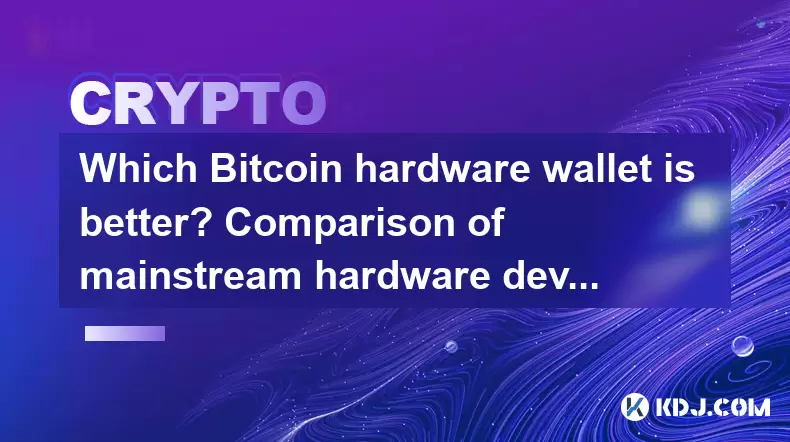
Which Bitcoin hardware wallet is better? Comparison of mainstream hardware devices
Jun 16,2025 at 02:08am
What Is a Bitcoin Hardware Wallet?A Bitcoin hardware wallet is a physical device designed to securely store the private keys associated with your cryptocurrency holdings. Unlike software wallets, which are more vulnerable to online threats, hardware wallets keep private keys offline, significantly reducing the risk of unauthorized access. These devices ...

What are Bitcoin non-custodial wallets? Self-controlled private key recommendation
Jun 16,2025 at 11:29pm
Understanding Bitcoin Non-Custodial WalletsA Bitcoin non-custodial wallet is a type of digital wallet where users retain full control over their private keys. Unlike custodial wallets, which are managed by third-party services such as exchanges, non-custodial wallets ensure that only the user can access and manage their funds. This means no intermediary...
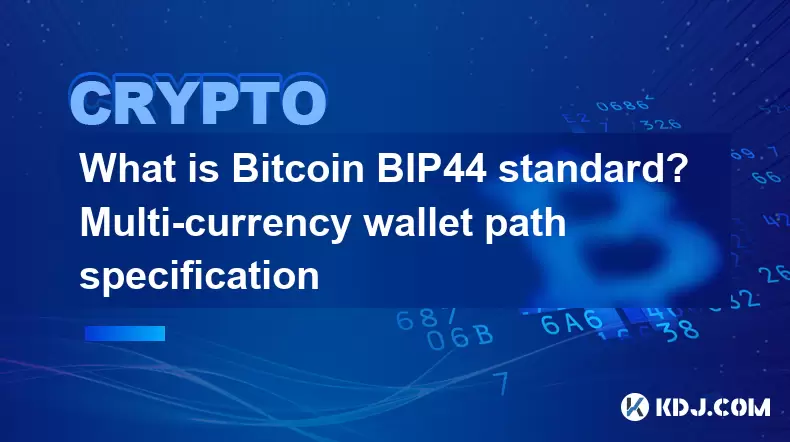
What is Bitcoin BIP44 standard? Multi-currency wallet path specification
Jun 15,2025 at 04:08pm
Understanding the BIP44 Standard in Bitcoin and CryptocurrencyThe BIP44 standard, which stands for Bitcoin Improvement Proposal 44, is a widely adopted hierarchical deterministic wallet structure used across various cryptocurrencies. It defines a structured path format that enables wallets to support multiple currencies while maintaining consistency and...
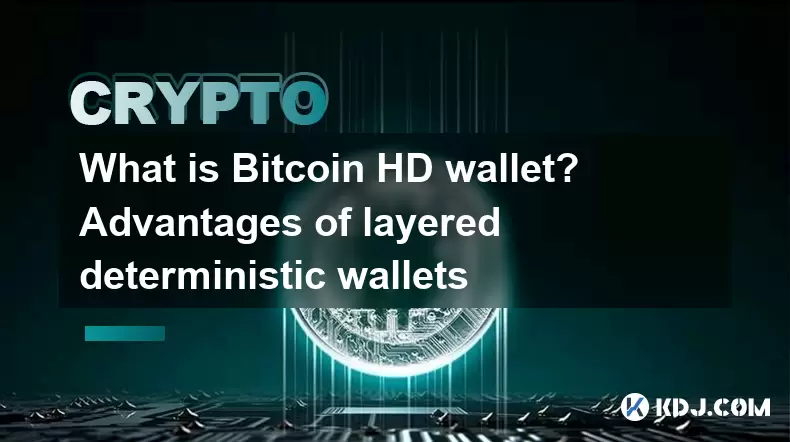
What is Bitcoin HD wallet? Advantages of layered deterministic wallets
Jun 16,2025 at 03:56pm
Understanding Bitcoin HD WalletsA Bitcoin HD wallet, or Hierarchical Deterministic wallet, is a type of cryptocurrency wallet that generates multiple keys and addresses from a single seed phrase. Unlike traditional wallets that create random private keys for each transaction, an HD wallet follows a structured hierarchy to derive keys in a deterministic ...

Is Bitcoin zero-confirmation transaction risky? Zero-confirmation usage scenarios
Jun 15,2025 at 03:57am
Understanding Zero-Confirmation Transactions in BitcoinBitcoin zero-confirmation transactions, often referred to as 'unconfirmed transactions,' are those that have been broadcast to the network but have not yet been included in a block. This means they have not received any confirmations from miners. While these transactions can be useful in certain con...
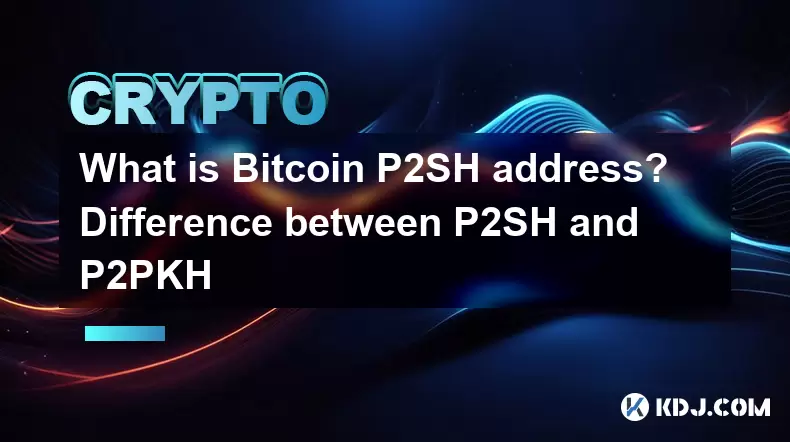
What is Bitcoin P2SH address? Difference between P2SH and P2PKH
Jun 16,2025 at 09:49pm
Understanding Bitcoin P2SH AddressesA Pay-to-Script-Hash (P2SH) address in the Bitcoin network is a type of address that allows users to send funds to a script hash rather than directly to a public key hash, as seen in earlier address formats. This innovation was introduced through BIP 16, enhancing flexibility and enabling more complex transaction type...

Which Bitcoin hardware wallet is better? Comparison of mainstream hardware devices
Jun 16,2025 at 02:08am
What Is a Bitcoin Hardware Wallet?A Bitcoin hardware wallet is a physical device designed to securely store the private keys associated with your cryptocurrency holdings. Unlike software wallets, which are more vulnerable to online threats, hardware wallets keep private keys offline, significantly reducing the risk of unauthorized access. These devices ...

What are Bitcoin non-custodial wallets? Self-controlled private key recommendation
Jun 16,2025 at 11:29pm
Understanding Bitcoin Non-Custodial WalletsA Bitcoin non-custodial wallet is a type of digital wallet where users retain full control over their private keys. Unlike custodial wallets, which are managed by third-party services such as exchanges, non-custodial wallets ensure that only the user can access and manage their funds. This means no intermediary...

What is Bitcoin BIP44 standard? Multi-currency wallet path specification
Jun 15,2025 at 04:08pm
Understanding the BIP44 Standard in Bitcoin and CryptocurrencyThe BIP44 standard, which stands for Bitcoin Improvement Proposal 44, is a widely adopted hierarchical deterministic wallet structure used across various cryptocurrencies. It defines a structured path format that enables wallets to support multiple currencies while maintaining consistency and...

What is Bitcoin HD wallet? Advantages of layered deterministic wallets
Jun 16,2025 at 03:56pm
Understanding Bitcoin HD WalletsA Bitcoin HD wallet, or Hierarchical Deterministic wallet, is a type of cryptocurrency wallet that generates multiple keys and addresses from a single seed phrase. Unlike traditional wallets that create random private keys for each transaction, an HD wallet follows a structured hierarchy to derive keys in a deterministic ...

Is Bitcoin zero-confirmation transaction risky? Zero-confirmation usage scenarios
Jun 15,2025 at 03:57am
Understanding Zero-Confirmation Transactions in BitcoinBitcoin zero-confirmation transactions, often referred to as 'unconfirmed transactions,' are those that have been broadcast to the network but have not yet been included in a block. This means they have not received any confirmations from miners. While these transactions can be useful in certain con...

What is Bitcoin P2SH address? Difference between P2SH and P2PKH
Jun 16,2025 at 09:49pm
Understanding Bitcoin P2SH AddressesA Pay-to-Script-Hash (P2SH) address in the Bitcoin network is a type of address that allows users to send funds to a script hash rather than directly to a public key hash, as seen in earlier address formats. This innovation was introduced through BIP 16, enhancing flexibility and enabling more complex transaction type...
See all articles

























































































